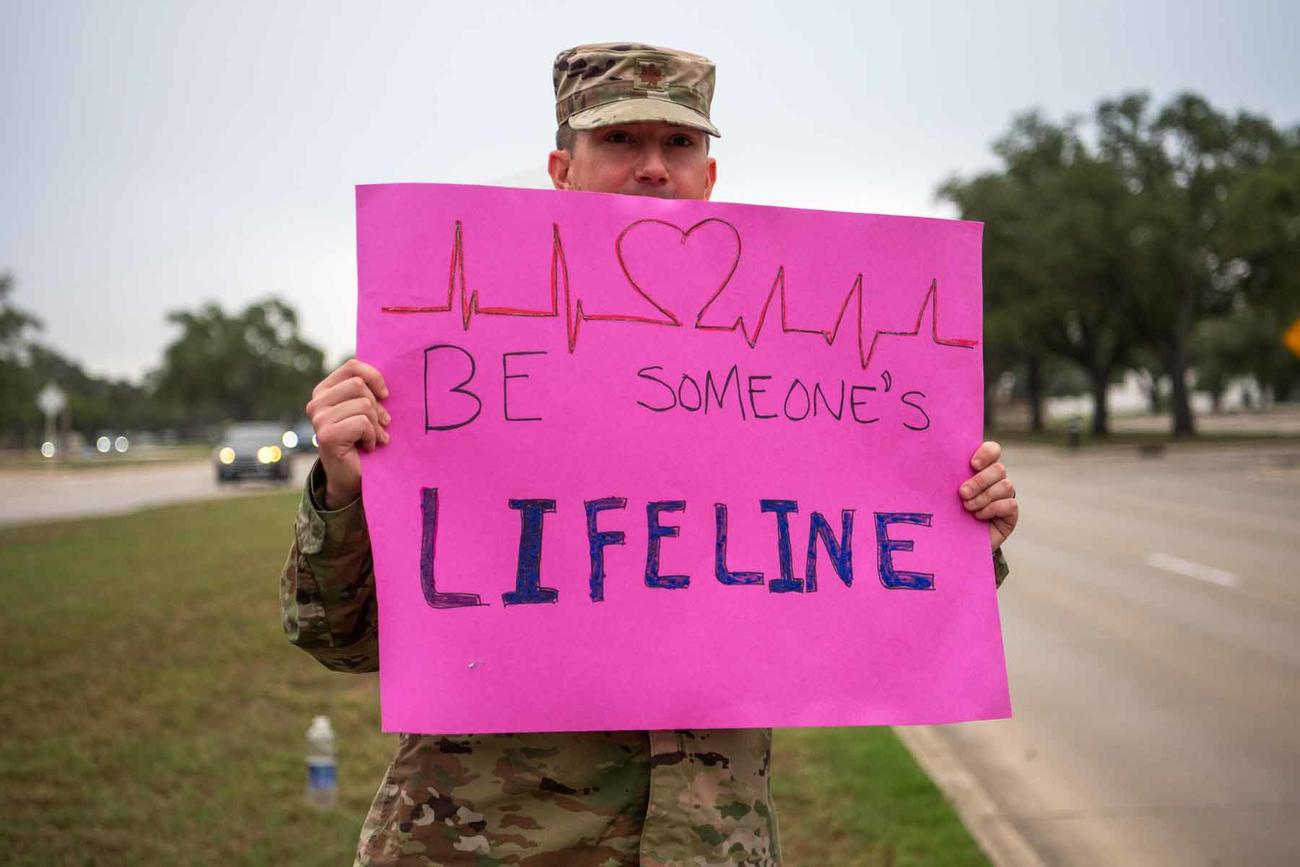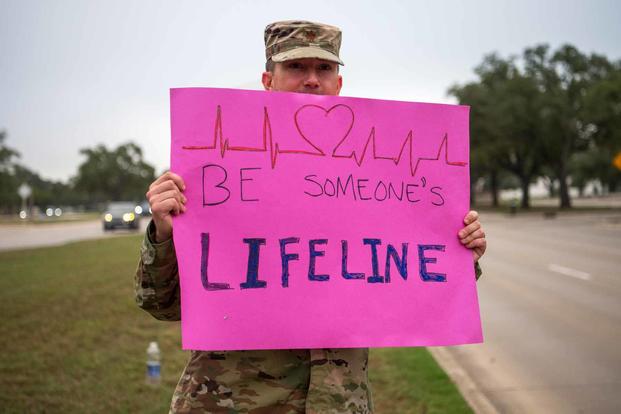

When Amy Antioho needed help caring for her dying husband at their Berlin, Connecticut, house, she found home health care services through the Code of Support Foundation — assistance that gave Antioho time to support her Army veteran’s battle against brain cancer and also parent their young son.
“I feel like I wouldn’t be standing if it wasn’t for them,” Antioho said of Code of Support in an interview with Military.com. “They help connect veterans with other organizations that can help, and they help them so they also can help themselves.”
A website, called PatriotLink, that brings Code of Support’s assistance program to a broader veteran audience was among 30 selected by the Department of Veterans Affairs to receive $250,000 each and advance in the department’s competition to reduce veteran suicide.
Read Next: American Veterans Captured by Russian-Backed Forces in Ukraine Coming Home, Families Say
From apps to virtual reality, the programs chosen as winners in the Mission Daybreak competition’s first phase offer a variety of solutions to address veteran wellness, prevent suicide and improve quality of life.
“Suicide is one of the most serious public health issues facing our veterans today,” VA Under Secretary for Health Dr. Shereef Elnahal said Monday in a statement. “Through Mission Daybreak, VA is driving groundbreaking collaborations to transform suicide prevention efforts for Veterans — and all Americans.”
The VA announced the winners of the contest Monday, the same day it released its 2020 data on veteran suicide that showed the numbers have declined in the past two years and are at their lowest since 2006.
According to the VA, 6,146 veterans took their own lives in 2020, down from 6,488 the year before and 6,796 in 2018.
To further reduce these tragedies, the VA launched Mission Daybreak in May to motivate businesses, nonprofit organizations and individuals to develop solutions to improve veterans’ lives and reduce suicide.
More than $20 million is at stake, with the 30 recipients receiving $250,000 each, and the eventual winners taking away prizes of $3 million and $1 million. Another 10 proposals were selected to receive $100,000 to pursue their ideas, but they will not advance.
“The VA is recognizing that the community has a part to play here, in developing solutions, because you can’t just keep doing the same thing over and over again and expect different results,” said Kristina Kaufmann, chief executive officer of the Code of Support Foundation, which has offered a limited version of PatriotLink for the past four years.
PatriotLink, a cloud-based platform that connects veterans with vetted resources in their hometowns, is one of several technology platforms or apps selected to advance in the competition in the first phase. Other technology-driven solutions include crowdsourcing programs, augmented intelligence that combines human support with artificial intelligence to help veterans in crisis, and virtual and extended reality, which combines the real environment with virtual reality, to address mental and physical wellness.
Three of the selected programs address safe storage of weapons, including Sentinel, an app that encourages safe storage and integrates Bluetooth-enabled firearms locking devices while also connecting veterans and families with one another.
While most of the recipients’ proposals are for the broader veteran user, several seek to help smaller populations with high rates of suicide. Two build on or jump-start programs tailored to Native Americans and Native Alaskans, including Televada, which aims to increase broadband access and technology literacy on tribal lands to increase access to mental health, and HermTac, which uses artificial intelligence and learning to reduce the stigma of seeking help and monitor veterans during times of crisis.
Another, known as BioMojo, helps incarcerated veterans, as well as those who work in prisons, by using extended reality to provide cognitive behavioral therapy through interactive roleplay and calming scenarios.
The 30 honorees have now entered a phase where they receive support and must hone their ideas for a demonstration day before judges in November. Two winners will receive $3 million each; three second-place winners will get $1 million each; and five 3rd place recipients each will get $500,000.
Among the issues the 10 “Promise Grant” recipients, who will not advance in the competition, sought to address were food insecurity and its link to mental health crises, crisis line support via text to Spanish-speaking veterans, and a tracker that allows veterans to record their state of mind to improve awareness and communications with their doctor or therapist.
In reviewing the winners, Kaufmann said she is encouraged by the selection and looks forward to the day when she can see them in person and meet the people behind them — a “science fair of sorts,” she said.
“When you look at the solutions or the companies and the organizations, they’re across the board — some of them are really addressing upstream [the big picture]. Some are addressing folks in immediate crisis. We need all of that. … We need these ideas, because when you think about all the effort that we’ve put in, whether we’re nonprofits, government, whatever, we haven’t moved the needle very much,” Kaufmann said.
A full list of recipients can be found here.
Veterans and service members experiencing a mental health emergency can call the Veteran Crisis Line, 988 and press 1. Help also is available by text, 838255, and via chat at VeteransCrisisLine.net.
— Patricia Kime can be reached at [email protected]. Follow her on Twitter @patriciakime.
Related: Group Tries to Overload VA Crisis Line to Protest Prosecutions of Capitol Rioters
© Copyright 2022 Military.com. All rights reserved. This material may not be published, broadcast, rewritten or redistributed.
